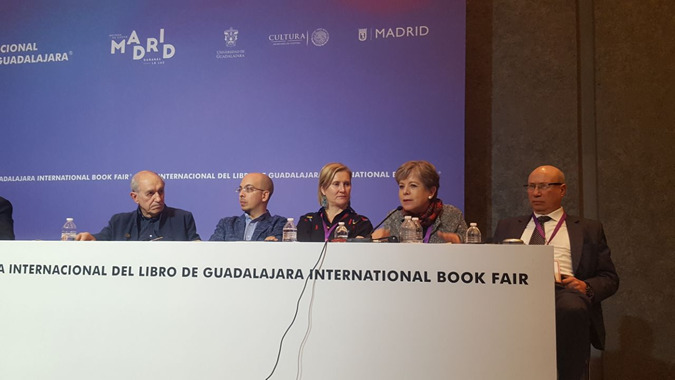Alicia Bárcena Urges Construction of Markets at the Service of Society
ECLAC’s Executive Secretary participated today in the closing of the international forum The Siege Upon Civilization: From Wall to Wall, organized by the National Autonomous University of Mexico and the University of Guadalajara.

“We must build a future that effectively recognizes the market, but a market that is at the service of society, and not a society at the service of the market,” asserted Alicia Bárcena, Executive Secretary of the Economic Commission for Latin America and the Caribbean (ECLAC) today during the closing ceremony of the international forum The Siege Upon Civilization: From Wall to Wall, held today in Mexico.
The ECLAC senior representative was invited to close the event organized by the National Autonomous University of Mexico (UNAM) and the University of Guadalajara (UDG).
During her remarks, Alicia Bárcena urged the countries of Latin America and the Caribbean to change the prevailing development style and move toward one of sustainable development with equality at its core.
“We must profoundly change the development style; capitalism does not work. We need to move toward a future that effectively recognizes the market, but a market that is at the service of society, and not a society at the service of the market,” emphasized ECLAC’s Executive Secretary.
The United Nations high official called for “deep reflection on the profound time of change we are living.” She pinpointed multilateralism and regional integration as the right path to tear down walls and bury inequalities and to leverage the implementation of the 2030 Agenda and its 17 Sustainable Development Goals.
“We must not forget that the 2030 Agenda is universal, not only in the sense that it aims to include all countries and that its fulfillment only makes sense if it is intended on a planet-wide scale. But also, in the same way that national efforts can be bolstered, they can also be severely compromised if there is no global or regional cooperation,” said Bárcena.
She added that the 2030 Agenda proposes the expansion of trade and correction of imbalances, avoiding recessive adjustments to economies in deficit. She called for better governance of international finances to prevent crises like the one of 2008, as well as speculative bubbles in currency, real estate and commodities markets. She urged the expansion of social policies and progress toward a social welfare state without eroding tax bases, competition and investment in countries that adopt higher standards when it comes to protecting the working world and combatting inequality. And she called for controlling and penalizing environmental externalities and the predatory use of natural resources.
“Taking stock of the profound transformations that will allow us to achieve the goal the world has set for the next 13 years, in our region means embracing progressive structural change,” concluded the ECLAC Executive Secretary.
The international forum began this past November 15th in Mexico City with a grand debate on the Origins Project: Climate change, social and environmental implications for Mexico and the world, led by Arizona State University (ASU) from the United States.
Distinguished figures participating in the debate included ECLAC’s Executive Secretary, Alicia Bárcena; Lawrence Krauss, professor at the ASU School of Earth and Space Exploration and director of the Origins project; Noam Chomsky, linguist, philosopher, cognitive scientist, historian, social critic and activist, as well as Emeritus Professor at the Massachusetts Institute of Technology (MIT); and Mario Molina, Mexican chemist, co-recipient of the Nobel Prize in Chemistry 1995, and currently professor at the University of California, San Diego, among others.
The forum continued on November 25 in Guadalajara with the backdrop of the International Book Fair going on in that city.
Type
Country(ies)
- Latin America and the Caribbean